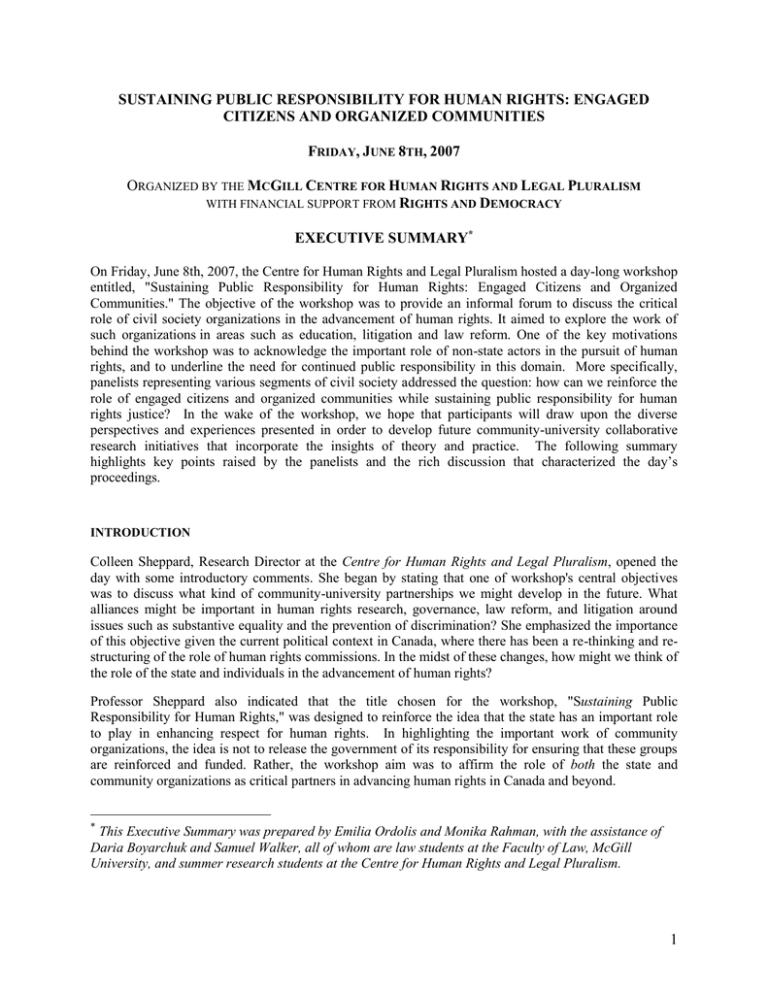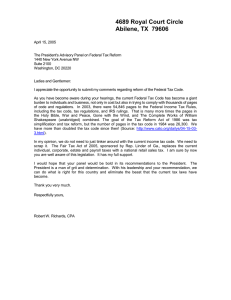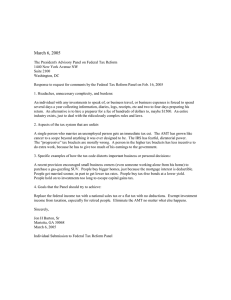SUSTAINING PUBLIC RESPONSIBILITY FOR HUMAN RIGHTS: ENGAGED CITIZENS AND ORGANIZED COMMUNITIES F
advertisement

SUSTAINING PUBLIC RESPONSIBILITY FOR HUMAN RIGHTS: ENGAGED CITIZENS AND ORGANIZED COMMUNITIES FRIDAY, JUNE 8TH, 2007 ORGANIZED BY THE MCGILL CENTRE FOR HUMAN RIGHTS AND LEGAL PLURALISM WITH FINANCIAL SUPPORT FROM RIGHTS AND DEMOCRACY EXECUTIVE SUMMARY* On Friday, June 8th, 2007, the Centre for Human Rights and Legal Pluralism hosted a day-long workshop entitled, "Sustaining Public Responsibility for Human Rights: Engaged Citizens and Organized Communities." The objective of the workshop was to provide an informal forum to discuss the critical role of civil society organizations in the advancement of human rights. It aimed to explore the work of such organizations in areas such as education, litigation and law reform. One of the key motivations behind the workshop was to acknowledge the important role of non-state actors in the pursuit of human rights, and to underline the need for continued public responsibility in this domain. More specifically, panelists representing various segments of civil society addressed the question: how can we reinforce the role of engaged citizens and organized communities while sustaining public responsibility for human rights justice? In the wake of the workshop, we hope that participants will draw upon the diverse perspectives and experiences presented in order to develop future community-university collaborative research initiatives that incorporate the insights of theory and practice. The following summary highlights key points raised by the panelists and the rich discussion that characterized the day’s proceedings. INTRODUCTION Colleen Sheppard, Research Director at the Centre for Human Rights and Legal Pluralism, opened the day with some introductory comments. She began by stating that one of workshop's central objectives was to discuss what kind of community-university partnerships we might develop in the future. What alliances might be important in human rights research, governance, law reform, and litigation around issues such as substantive equality and the prevention of discrimination? She emphasized the importance of this objective given the current political context in Canada, where there has been a re-thinking and restructuring of the role of human rights commissions. In the midst of these changes, how might we think of the role of the state and individuals in the advancement of human rights? Professor Sheppard also indicated that the title chosen for the workshop, "Sustaining Public Responsibility for Human Rights," was designed to reinforce the idea that the state has an important role to play in enhancing respect for human rights. In highlighting the important work of community organizations, the idea is not to release the government of its responsibility for ensuring that these groups are reinforced and funded. Rather, the workshop aim was to affirm the role of both the state and community organizations as critical partners in advancing human rights in Canada and beyond. * This Executive Summary was prepared by Emilia Ordolis and Monika Rahman, with the assistance of Daria Boyarchuk and Samuel Walker, all of whom are law students at the Faculty of Law, McGill University, and summer research students at the Centre for Human Rights and Legal Pluralism. 1 PANEL I: L’ACTION ENGAGÉE PAR LES ORGANISATIONS DE LA SOCIÉTÉ CIVILE EN FAVEUR DES DROITS DE LA PERSONNE (ACTIONS EN JUSTICE, ÉDUCATION, RÉFORME DU DROIT) The speakers in the first panel represented a variety of organizations that play different roles in advancing human rights and promoting legal and social change. Kristine Doederlein, from Le Groupe d'aide et d'information sur le harcèlement sexuel au travail, spoke of the need to collaborate with those who witness specific human rights problems on the ground. Her experience underlined the challenges posed by financial insecurity, and the importance of freedom for empowering victims through a diverse scope of services. Furthermore, she highlighted the importance of promoting social change through education and sensitivity training in the community. Similarly, Andrée Côté, of l'Association nationale femmes et droit, spoke to the need for research-action, pertinent projects and the use of concrete language by universities in supporting law reform groups. In applauding the revolutionary role that women's groups have played in law reform and democratic development, she described the recent budget cuts by the Harper government to areas such as advocacy as attempts to literally erase the opposition, and as a refusal to promote systemic change. Frédéric Hareau, of Equitas, the International Centre for Human Rights Education, spoke to the role of education in building a culture of human rights. He emphasized the importance of empowerment, reinforcing capacities, and methodologies that centre upon the experiences of those involved. Highlighting the role of education in changing societal norms, he offered an example of the ability of children to take responsibility for turning musical chairs into a game of inclusion rather than exclusion, reflecting the role of all members of civil society in promoting human rights. Finally, Nandini Ramanujam, of the Centre for Human Rights and Legal Pluralism, brought a global perspective to the discussion. Building upon the theme of education, she explored the role of NGOs in the strengthening of human rights at the international level. Emphasizing the importance of a communitybased approach, she described the work of the Open Society Institute in empowering the Roma ethnic minority in Eastern Europe through civil and political participation. Key themes in the discussion that followed included the importance of formulating research mandates in collaboration with groups who work on the ground, the importance of education and community-outreach in effecting real social change, and the difficulties experienced due to financial insecurity. With regard to the latter, the role and legitimacy of private donors in determining research and policy agendas was raised as an often overlooked dynamic in the work of community organizations. PANEL II: INSTITUTIONAL GOVERNANCE: CONSULTATION & PARTICIPATORY DEMOCRACY The second panel focused on institutional dynamics of human rights work and particularly the interplay between public and non-governmental actors in this regard. Guylaine Vallée, of the École des relations industrielles at Université de Montréal, highlighted how unions are increasingly invoking external human rights norms in the Charter, thus taking on the important role of institutionalizing and enforcing individual rights in the workplace. She also drew attention to some of the limitations of unions as an avenue for human rights enforcement, including the difficulty of reconciling the tension between unions’ majoritarian logic with the struggles of minority groups, the absence of unions in smaller and informal workplaces where discrimination is prominent, and challenges of access to justice posed by institutional delays. 2 Lucie Lamarche, of the Faculté de droit at Université d’Ottawa, considered several examples of the evolving role of non-governmental actors in human rights work, including the increasing “contractingout” of state functions to non-state actors through “public-community partnerships”. She also identified notable trends at international and local levels. At the international level, she called attention to the difficulties experienced by NGOs in getting their issues of concern on the United Nations agenda. At the local level, the Montreal Charter initiative demonstrates the centrality of citizen collaboration in human rights work, and the recent emphasis on mutual citizen-state rights and responsibilities. Pearl Eliadis, a human rights lawyer in Montreal, raised concerns about legal accountability for human rights services and functions in light of the increasing “hollowing out” and delegation of responsibility by the state – the party obliged by law to realize human rights. She argued for the need to reconceptualize human rights commissions, not as administrative actors, but as actors that examine deeper, long-term issues and articulate a broader vision of human rights to the public. She also commented on the challenges posed to the independence of human rights commissions by limited resources, an increasing work burden, and government interference. In the ensuing discussion, the need for complementarity and cooperation between community organizations and state actors was raised, particularly given the strategic advantage of the former in identifying pressing concerns on the ground and imparting this knowledge to public bodies. Questions of accountability and legitimacy were also discussed, with emphasis placed on the importance of dialogue in ensuring accountability of all actors, including NGOs. It was noted that different actors possess diverging interpretations of the meaning of accountability, and that high costs of engagement can sometimes act as a deterrent to civil society participation. PANEL III: LE RENFORCEMENT DU RÔLE DES MOUVEMENTS POPULAIRES ET DES ORGANISATIONS NON GOUVERNEMENTALES The final panel brought together practical and theoretical insights regarding partnerships between civil society, the state and the academic community in advancing human rights. Fiona Sampson, of the Women's Legal Education and Action Fund (LEAF), infused the discussion with lessons from LEAF’s experience in advancing women’s equality rights through litigation, law reform and education. She explained that LEAF now acts predominantly as an intervener in important cases, rather than sponsoring individual claimants, and underscored the importance of having current academic research and publications to support their arguments in litigation. She noted that, in spite of the current conservative climate, LEAF’s participation has contributed to varying success in certain decisions, and drew attention to the indivisibility of litigation from broader law reform strategies. Pierre Blain, of Fondation Emergence, also raised the need of community organizations for supportive academic publications when applying for funding. He then expressed the necessity of drawing attention to invisible minorities not named in the Charter, particularly the gay and lesbian community, and moving beyond modest goals of mere toleration towards achieving inclusion, acceptance, and integration. Finally, he encouraged increased solidarity and cultivation of partnerships among minority groups facing similar challenges in their advocacy work. Razmik Panossian, of Rights and Democracy, described the organization’s work in the area of democratization and the importance of engagement by both elites and civil society to developing democratic practices. He emphasized the need to tailor strategies according to the nature of a country’s state regime and civil society structure, and to help build linkages between the two whenever possible. He 3 also noted that Rights and Democracy attempts to translate academic scholarship into concrete policy papers, and concluded by noting that the conservative political climate is indeed global in scope, and warned of increasing backlash against human rights as a perceived Western concept. René Provost, of the Centre sur les droits de la personne et le pluralisme juridique, brought the day’s final panel to a close by sharing an example of a successful model of community-university collaboration. McGill University’s Special Court for Sierra Leone Legal Clinic provides legal research support by law students in Montreal via electronic correspondence to the Special Court in Freetown, and exemplifies the effective matching of needs with capacity. He concluded by reflecting on the concept of legal pluralism, which sees law emerging in multiple sites in society, and posits that civil society is not just using law, but participates in its production. In the discussion, participants exchanged ideas regarding the interplay between formal law and social norms, values, and informal practices within institutions. Some participants expressed concern about the danger of legal pluralism establishing parallel sites of legitimacy, given the hard-fought successes in formal law reform, and the fragility of positive law in the human rights context. Others pointed to the abundance of informal practices and prevalent attitudes which belie the realization of human rights and underscore the need to understand “law” in multiple forms. It was agreed that formal legal reform and endeavors to change social norms are not mutually exclusive. CONCLUSION: WHERE DO WE GO FROM HERE? In the workshop’s final roundtable discussion, Professor Sheppard began by reiterating some of the day’s recurrent themes: particularly, the necessity of formulating a “bottom-up” research agenda while working in partnership with community organizations, and taking into consideration resource constraints and the structural vulnerability of such organizations. Participants focused on possible methods and procedures for building relationships between the academic community and local organizations, and underlined the importance of maintaining a dialogue to determine an appropriate research agenda and focus legal expertise. Universities were described as having adequate resources for reflection, but not for building linkages with the community, while local organizations are known to face resource constraints when attempting to do reflective work in addition to their community engagement. Final discussion attributed chief importance to increasing dialogue between actors, and to the role of such interaction in cultivating necessary relationships. Participants recognized the pressing need to understand how to transform research questions into initiatives that suit the needs of the community. 4



